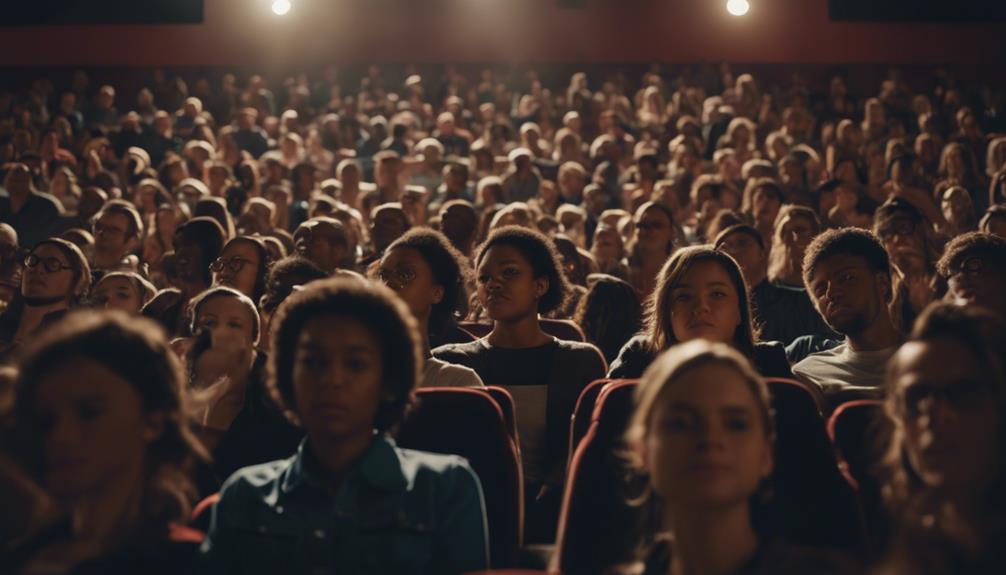Explore the must-watch TED Talks for profound insights. Brené Brown reveals the power of vulnerability in fostering genuine connections. Dan Pink challenges motivation norms, highlighting intrinsic rewards. Amy Cuddy dissects body language's impact on self-perception. Apollo Robbins uncovers the art of misdirection in psychology. Discover the science behind everlasting cells for anti-aging strategies. Uncover Monica Lewinsky's take on 'The Price of Shame' and Chimamanda Adichie's 'The Danger of A Single Story'. Embrace authenticity with Caroline McHugh's 'The Art of Being Yourself' and decipher Hannah Fry's 'The Mathematics of Love'. Each TED Talk offers a unique lens worth exploring further.
Key Takeaways
- Brené Brown on embracing vulnerability for deeper human connections.
- Dan Pink challenges motivation norms, emphasizing intrinsic over extrinsic motivation.
- Amy Cuddy explores body language's impact on self-perception and success.
- Apollo Robbins reveals the psychology of misdirection in magic.
- Research on cell immortality offers insights into regenerative medicine and anti-aging therapies.
The Power of Vulnerability
In Brené Brown's TED Talk on the Power of Vulnerability, she explores the significance of embracing vulnerability for deeper human connections. Brown emphasizes that allowing ourselves to be vulnerable is essential for establishing genuine empathy and fostering authentic relationships with others.
She examines the concept of vulnerability as a courageous act that enables individuals to truly connect with one another on a deeper level, leading to a sense of belonging and love. Through her research on vulnerability and courage, Brown underscores the importance of authenticity in human interactions.
She asserts that having the courage to be vulnerable and show our true selves is fundamental in creating meaningful connections and cultivating empathy. Brown's talk on the Power of Vulnerability serves as a powerful reminder of the transformative impact vulnerability can have on our relationships and our ability to connect with others authentically.
The Puzzle of Motivation

Dan Pink's TED talk on motivation challenges conventional wisdom by emphasizing the role of incentives in driving performance and the importance of autonomy in fostering engagement.
He explores the distinction between intrinsic and extrinsic motivation in the workplace, advocating for a reevaluation of reward systems to enhance motivation levels.
Pink's insights encourage a deeper understanding of human motivation, suggesting that monetary incentives alone may not be sufficient to drive long-term engagement and productivity.
Incentives Drive Performance
Challenging traditional notions of rewards and motivation, Dan Pink's TED Talk explores the puzzle of motivation by investigating the impact of intrinsic versus extrinsic incentives on performance. Pink explores the intricate relationship between motivation, rewards, autonomy, and performance, shedding light on how conventional reward systems may not always lead to ideal outcomes.
Here are some key takeaways from Pink's insightful talk:
- Pink challenges the belief that external rewards are the primary drivers of performance.
- He emphasizes the importance of intrinsic motivation in fostering long-term engagement and satisfaction.
- Pink highlights the role of autonomy in empowering individuals to perform at their best.
- The talk advocates for a shift towards more comprehensive approaches to motivation that consider human psychology and behavior.
Pink's examination of incentives and their impact on performance offers a fresh perspective on how to effectively motivate individuals in various settings.
Autonomy Fosters Engagement
Autonomy plays a significant role in fostering engagement and motivation, as highlighted in the exploration of incentives by Dan Pink in his TED Talk on the puzzle of motivation. Pink challenges traditional views on rewards by emphasizing the impact of autonomy on productivity.
He investigates the distinction between intrinsic and extrinsic motivation, advocating for a reevaluation of reward systems to promote autonomy in the work environment. By emphasizing autonomy, Pink underscores its pivotal role in driving motivation and engagement among individuals.
The talk shines a light on the importance of intrinsic motivation over external rewards, suggesting that personal drive and autonomy are key factors in enhancing productivity and job satisfaction. Pink's insights urge a shift towards fostering autonomy within organizations to cultivate a more engaged and motivated workforce, ultimately leading to improved performance and satisfaction levels.
Your Body Language Shapes Who You Are

How does your body language shape who you're in various aspects of life?
In Amy Cuddy's TED talk 'Your Body Language Shapes Who You Are,' she explores the profound impact of body language on self-perception, confidence, and communication. Here are some key takeaways from the talk:
- Power Posing:
Cuddy highlights the concept of power posing, where adopting expansive postures can boost confidence and potentially influence success.
- Hormone Levels:
The talk investigates how body language can affect hormone levels, impacting stress levels and overall well-being.
- Self-Perception:
Research presented in the talk reveals a strong connection between body language and self-confidence, indicating that how you carry yourself can shape how you see yourself.
- Enhanced Communication:
By adopting confident postures, individuals can improve their communication skills and how they're perceived by others.
Incorporating these insights into your daily life can lead to positive changes in how you perceive yourself and interact with the world around you.
The Art of Misdirection

In exploring the world of deception and perception, magician Apollo Robbins sheds light on 'The Art of Misdirection' in his enthralling TED Talk. Lasting 8 minutes and 48 seconds, Robbins delves into the psychology behind misdirection in magic tricks. He demonstrates how misdirection can influence perception, emphasizing the pivotal role of attention and focus in creating illusions that captivate audiences.
Robbins' talk reveals the intricate techniques magicians employ to manipulate attention, guiding viewers to see what they want them to perceive while diverting focus from the true actions taking place. By understanding the principles of misdirection, one gains insight into the subtle ways in which the mind can be tricked, showcasing the importance of perception and the vulnerability of human attention.
Through Robbins' engaging presentation, viewers gain a deeper appreciation for the artistry and skill involved in creating illusions that challenge our understanding of reality. His exploration of misdirection serves as a reminder of the fascinating interplay between perception and deception in the world of magic.
The Science of Cells That Never Get Old

When exploring the science of cells that never age, you'll uncover the fascinating domain of eternal youth within our biological makeup. Researchers are diligently deciphering the intricate processes that allow these cells to regenerate and remain immortal.
This research holds immense potential for revolutionizing healthcare by offering new paths to rejuvenating aging cells and revealing the secrets of cell immortality.
Eternal Youth in Cells
Reveal the secrets of eternal youth in cells by delving into the fascinating science behind their ability to never age. Understanding the intricate mechanisms that govern cell longevity sheds light on potential breakthroughs in regenerative medicine and combating aging-related diseases.
- Research on eternal youth in cells focuses on the vital role of telomeres, the protective caps at the end of chromosomes.
- Exploring how cells maintain their youthful state offers insights into combating aging-related diseases.
- Implications for regenerative medicine highlight the potential to harness the secrets of eternal youth for therapeutic purposes.
- Unraveling the science of immortal cells paves the way for advancements in understanding human health and longevity.
Regenerating Aging Cells
Exploring the science behind regenerating aging cells reveals the remarkable potential to rejuvenate cellular vitality and combat the effects of aging.
Scientists have made significant advancements in understanding how to revitalize aging cells, fundamentally reversing the aging process at a cellular level.
This groundbreaking research investigates the mechanisms that prevent certain cells from aging, offering new insights into cellular regeneration.
The study of cells that never get old holds promise for developing anti-aging therapies that could potentially treat age-related diseases.
By deciphering the secrets of rejuvenating aging cells, researchers are paving the way for revolutionary advancements in healthcare that could extend human lifespan and improve quality of life.
This quest to uncover the mysteries of cellular rejuvenation signifies a critical step towards combating age-related ailments, offering hope for a future where aging may be managed effectively through scientific innovations.
Cell Immortality Research
Investigating the science of cells that never age explores the fascinating domain of cell immortality research. Delving into this field uncovers the intricate mechanisms that enable certain cells to defy the natural process of aging and death.
Immortal cells, such as the renowned HeLa cells, possess unique characteristics that sustain their ability to divide endlessly. Scientists scrutinize these cells to gain profound insights into aging, cancer development, and the potential applications in regenerative medicine.
Understanding the secrets behind cell immortality holds promising prospects for advancing treatments for age-related diseases and combating cancer. Research in this area not only sheds light on the complex nature of cell biology but also paves the way for innovative therapeutic strategies to address various health challenges.
The Surprising Science of Happiness

Discussing the surprising science of happiness, Dan Gilbert's TED talk challenges common misconceptions about what truly brings joy and fulfillment in life. In his presentation, Gilbert explores the intricate relationship between happiness, perception, and adaptability.
He introduces the concept of the psychological immune system, highlighting its pivotal role in helping individuals adjust to varying levels of happiness. By emphasizing the impact of perception on happiness levels and the potential sources of joy, Gilbert prompts viewers to reconsider their preconceived notions about well-being.
One of the key takeaways from Gilbert's talk is the idea that human happiness is remarkably adaptable, with mindset playing a critical role in shaping one's overall sense of contentment. Through his insightful exploration of the science behind happiness, Gilbert encourages a reevaluation of what truly contributes to a fulfilling life, challenging viewers to adopt a more nuanced perspective on the pursuit of happiness.
The Price of Shame

Monica Lewinsky's TED talk 'The Price of Shame' explores the detrimental effects of cyberbullying and public shaming, emphasizing the need for empathy in today's digital world.
She shares her personal journey of overcoming public humiliation and advocates for a more compassionate online environment.
Impact of Cyberbullying
With over 14 million views, 'The Price of Shame' TED Talk by Monica Lewinsky explores the profound impact of cyberbullying on mental well-being. In her talk, Lewinsky shares her personal experience of being publicly shamed and cyberbullied, emphasizing the lasting effects on mental health.
Here are key points discussed in the talk:
- Monica Lewinsky highlights the consequences of online harassment on individuals.
- She calls for increased empathy and compassion in the digital age to combat cyberbullying.
- Lewinsky advocates for a cultural shift towards kindness and accountability in online interactions.
- The TED Talk sheds light on the destructive nature of cyberbullying and stresses the importance of addressing online hate effectively.
Through her powerful narrative, Monica Lewinsky raises awareness about the detrimental effects of cyberbullying and the urgent need for a more compassionate online environment.
Overcoming Public Humiliation
Addressing the aftermath of public humiliation, Monica Lewinsky's TED talk 'The Price of Shame' sheds light on the lasting impact of online shaming and advocates for empathy and compassion in combating such experiences.
Lewinsky explores the consequences of cyberbullying, drawing from her personal encounter with public humiliation to highlight its enduring effects. She emphasizes the need for empathy in the face of online shaming, stressing the importance of understanding and kindness to counteract the destructive nature of public humiliation.
By sharing her story, Lewinsky brings attention to the detrimental effects of public shaming and calls for action to combat online harassment. Through her advocacy for compassion and understanding, she underscores the significance of overcoming public humiliation not only on an individual level but also in fostering a more supportive and respectful online environment for everyone.
Lewinsky's insights serve as a poignant reminder of the power of empathy in addressing the challenges posed by cyberbullying and online shaming.
The Danger of A Single Story

Exploring the TED Talk 'The Danger of A Single Story' by Chimamanda Ngozi Adichie sheds light on the pervasive influence of stereotypes and the critical need for diverse narratives. This talk has garnered over 25 million views, resonating with audiences worldwide.
Adichie delves into the impact of stereotypes and misconceptions, urging listeners to embrace diverse perspectives and the power of storytelling. Through personal anecdotes, she vividly illustrates the dangers of reducing individuals to a single narrative, emphasizing the need for nuanced and multifaceted portrayals of people and cultures.
- Adichie's TED Talk has sparked essential conversations about stereotypes and perceptions.
- The talk underscores the significance of embracing varied viewpoints to foster understanding.
- Adichie's storytelling prowess captivates the audience, driving home the importance of diverse narratives.
- 'The Danger of A Single Story' serves as a powerful reminder of the dangers of oversimplified judgments.
The Art of Being Yourself

Explore how embracing vulnerability can empower you to authentically express yourself and form deeper connections with others. Brené Brown's TED Talk delves into the significance of vulnerability in fostering authenticity and human connection.
By embracing vulnerability, individuals can cultivate deeper relationships and experience personal growth. Vulnerability acts as a powerful tool in nurturing empathy, fostering a sense of belonging, and cultivating love.
Research highlights the importance of vulnerability in self-discovery, emphasizing its role as a catalyst for courage and meaningful connections in life. When you allow yourself to be vulnerable, you open the door to genuine human interactions and establish a foundation for authentic relationships.
Through vulnerability, you not only showcase your true self but also invite others to connect with you on a deeper level, creating a space for empathy to thrive and relationships to flourish.
The Mathematics of Love

Hannah Fry's TED talk 'The Mathematics of Love' fascinatingly explores how math can predict the success of relationships. In her 17-minute and 5-second presentation, Fry explores the use of algorithms in analyzing love and dating, shedding light on the best stopping theory.
This theory revolves around the idea of when to settle in dating, employing mathematical principles to make informed decisions. In addition, Fry uncovers intriguing insights into the world of online dating algorithms, showcasing their effectiveness in matching individuals with compatible partners.
- Explore the world of mathematics and its role in understanding love.
- Investigate the intersection of algorithms and relationships in an engaging TED talk.
- Discover the best stopping theory and its significance in the world of dating.
- Unravel the complexities of online dating algorithms and how they impact our quest for love.
Frequently Asked Questions
What Are the 10 Most Popular TED Talks?
To find the 10 most popular TED Talks, start by looking at talks by Sir Ken Robinson on creativity, Amy Cuddy on body language, Tim Urban on procrastination, Brené Brown on vulnerability, and Simon Sinek on leadership.
What Is the Most Watched TED Talk Ever?
The most watched TED talk ever is 'Do Schools Kill Creativity?' by Sir Ken Robinson. It challenges traditional education's impact on creativity and advocates for nurturing it in students. It has garnered over 66 million views.
What Is Brené Brown's Most Famous Ted Talk?
Brené Brown's most famous TED Talk is 'The Power of Vulnerability.' In this 20-minute talk, she explores human connection, empathy, and love. Brown's insights on authenticity and courage have resonated with millions worldwide.
What Is the Difference Between TED Ed and TED Talk?
TED Ed focuses on educational content with lessons and animations for students and educators. In contrast, TED Talks feature speakers sharing insights on diverse topics for a broader audience. Both aim to inspire and educate uniquely.
What are the Key Lessons from Eddie Jaku’s TED Talk and how can they be applied in everyday life?
In his TED Talk, Eddie Jaku shared key lessons from happiest man, recounting his experiences from the Holocaust. The importance of forgiveness, kindness, and gratitude were highlighted. These lessons can be applied in everyday life by practicing empathy, letting go of grudges, and appreciating the present moment.
Conclusion
To sum up, these top 10 TED Talks offer a wealth of valuable insights and perspectives on a variety of topics. By taking the time to watch these talks, you can gain a deeper understanding of the world around you and perhaps even be inspired to make positive changes in your own life.
So, why not take a moment to sit back, relax, and enjoy the wisdom and knowledge that these speakers have to offer?









